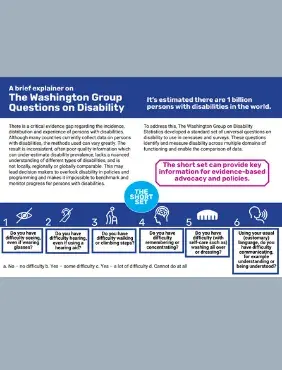It’s estimated there are 1 billion persons with disabilities in the world.
There is a critical evidence gap regarding the incidence, distribution and experience of persons with disabilities. Although many countries currently collect data on persons with disabilities, the methods used can vary greatly. The result is inconsistent, often poor-quality information which can under-estimate disability prevalence, lacks a nuanced understanding of different types of disabilities, and is not locally, regionally or globally comparable. This may lead decision makers to overlook disability in policies and programming and makes it impossible to benchmark and monitor progress for persons with disabilities.
To address this, The Washington Group on Disability Statistics developed a standard set of universal questions on disability to use in censuses and surveys. These questions identify and measure disability across multiple domains of functioning and enable the comparison of data.
The short set can provide key information for evidence-based advocacy and policies.





